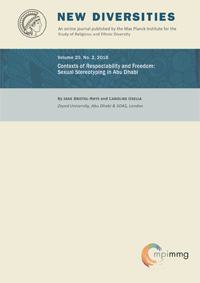Contexts of Respectability and Freedom: Sexual Stereotyping in Abu Dhabi
by Jane Bristol-Rhys and Caroline Osella (Zayed University, Abu Dhabi & SOAS, London)
To cite this article: Bristol-Rhys, J., & Osella, C. (2018). Contexts of Respectability and Freedom: Sexual Stereotyping in Abu Dhabi. New Diversities, Article 20(2). https://doi.org/10.58002/h3j7-n684
Walking in Abu Dhabi is to join a parade of nationalities, religions, languages, and conflicting ideas on what constitutes appropriate public dress and demeanour for women. Clothing can signal nationality, religion and degree of, if not piety, then cultural conservatism, as well as socio-economic status. While women from strict conservative regions may experience the cosmopolitan mix of people, clothing, and lifestyles as somewhat liberating, others chafe against the prescription to keep arms and legs covered. They discover quickly that a woman’s choice of clothing is also interpreted frequently to be a statement of her morality and sexual availability. In this article, we present some of the contrasting experiences of two groups of female migrants, Filipinas and Malayalis, as well as the perceptions about foreign women that are narrated frequently by Emiratis. Our ethnographic narrative is embedded in a critical analysis of intersectionality and similar categorisations that pay too little attention to context. In the superdiverse environment of the Gulf, it is context that dictates where a specific woman is “placed” in the good woman/bad woman/oppressed woman triangle.
|
